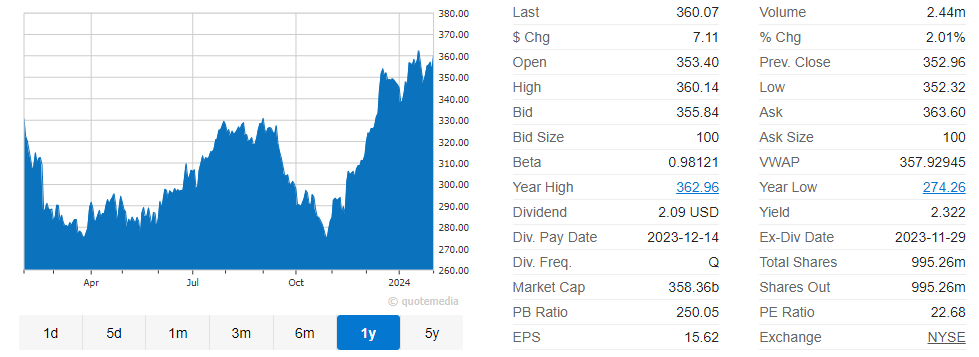Home Depot (NYSE:HD) is the world’s largest home improvement retailer. Founded in 1978, it has over 2,300 stores across the US, Canada, and Mexico today. Here, I’m going to take a look at Home Depot’s share price from an investment perspective. Is it a risky investment?
Home Depot stock: risk vs reward
Over the long term, Home Depot has been an excellent investment. This is a company with a strong track record when it comes to revenue and earnings growth. And this is reflected in its share price. Over the last 10 years, for example, the stock has risen from around $77 to $357 as the retailer’s sales and earnings have climbed. The company has also paid regular dividends over this period.

However, this stock does have its risks. Home Depot’s success is tied to the health of the US economy and housing market. If we were to see a downturn in housing construction or renovations, or a drop in consumer spending, the company may see lower demand for its products and services. This could hit its share price.
Another risk to consider is competition. Home Depot is dominant in its industry, with a market share of around 60%. However, it is up against some powerful rivals including online retailer Amazon. If these rivals were to offer lower prices, or better service, they could potentially steal market share from the company in the future.
It’s also worth touching on the company’s valuation. For the year ending 31 January 2025, Home Depot is expected to generate earnings per share of $15.60. That puts the stock’s forward-looking price-to-earnings (P/E) ratio at about 23. That’s not a crazy valuation given the company’s track record in terms of growth. But it is a little above the market average. If growth was to slow, the stock might come under pressure.
Is Home Depot a good long-term stock?
Despite all the risks I’ve highlighted, I see Home Depot as a decent long-term investment.
As I mentioned earlier, the company has a strong track record in terms of growth. Over the last five years, for example, revenue has climbed from $101 billion to $157 billion.
And looking ahead, there are several potential growth drivers including:
- Ageing homes: In the US, the average age of homes is increasing, leading to a greater need for repairs and renovations.
- The shift to hybrid work: The rise of hybrid work is leading to increased demand for home office setups.
- Demographics: Millennials are entering their prime homeownership years and are generally interested in do-it-yourself (DIY) projects and home improvement.
It’s also a very profitable company. Over the last five years, return on capital employed (ROCE) has averaged 48%, which is excellent. Companies that generate high ROCE tend to be good long-term investments.
As for dividends, these have been growing steadily in recent years. Currently, the yield on offer is about 2.3%.
Finally, the company has a strong brand, and is actively investing in technology to maintain its competitive edge.
Overall, there’s a lot to like about Home Depot from an investment perspective.
Is Home Depot a buy, hold or sell?
Looking at the investment case, I think Home Depot stock is worth buying today. Taking a long-term view, the company has plenty of potential.
That said, given its higher valuation, I don’t see it as a ‘strong buy’ right now. If I was looking to invest in Home Depot, I’d be staggering my investment over time in the hope of picking up some shares at a slightly lower valuation.

Based in London, Edward is a distinguished investment writer with an extensive client portfolio comprising a diverse array of prominent financial services firms across the globe. With over 15 years of hands-on experience in private wealth management and institutional asset management, both in the UK and Australia, he possesses a profound understanding of the finance industry.
Before establishing himself as a writer, Edward earned a Commerce degree from the prestigious University of Melbourne. Complementing his academic background, he holds the esteemed Investment Management Certificate (IMC) and is a proud holder of the Chartered Financial Analyst (CFA) qualification.
Widely recognized as a sought-after investment expert, Edward’s insightful perspectives and analyses have been featured on sites such as BlackRock, Credit Suisse, WisdomTree, Motley Fool, eToro, and CMC Markets, among others.


